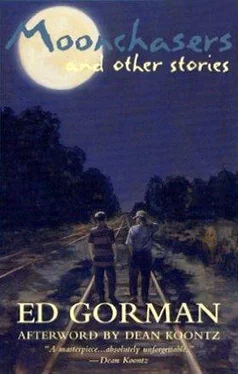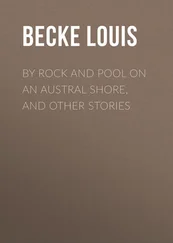We didn’t say anything then, just stood in shadow and moonlight and kind of slugged each other on the arm. Good old Barney. He was a pain in the ass sometimes but he was the only kid in town who knew who Ed Emsh the magazine cover artist was — so how could you turn your back on him?
I took out a cigarette and lit it and Barney looked at the lighter and said, “Roy’s lighter, huh?”
He took it and held it up to the moonlight. “Pretty cool. Those little red jewels for eyes and all.” He handed it back. “I spent my hundred bucks already. Did you?”
The governor had given us both one-hundred-dollar U.S. savings bonds last summer.
“Nah. I gave mine to Debbie. I didn’t feel right about spending it—” I knew this would make Barney feel bad and I wanted it to — then I thought about how poor his family was and how Barney always wore pretty old clothes and how Clarence always called Barney’s father “luckless” and I said, “But I don’t blame you for spending yours, Barney.”
“You really don’t?”
“No, Barney, I really don’t.” I socked him on the arm a few more times, like it was some kind of Olympic event I was training for, good old all-American arm-socking, and then we left.
We took a back road home, one that ran along the tracks, one that wouldn’t get us seen by any wandering cop cars, one that shone with frost.
“You didn’t find the money, huh?” he said.
“Huh-uh.”
“You going back?”
“Yeah. Tomorrow I’m gonna try the barn.”
“You mind if I come?”
“I’ll be pissed if you don’t.”
The next afternoon I got chewed out when the teacher found out that I had Halo for Satan by John Evans, which is a very good mystery, tucked down behind my history textbook.
Mrs. Morrissey, hoping to humiliate me, said, “And just what does Mr. Evans have to say about Napoleon?”
I just sat there and squirmed, the way she wanted me to. “Or what does Mr. Evans have to say about Mozart?”
More squirming.
“Or Woodrow Wilson?”
You get the point. She threw out several more historical names and asked me what Mr. Evans had to say about each one of them and all I could do was sit there and take it, all the while wanting to tell her that he was actually a good writer and that she should try reading him sometime but of course you don’t talk to teachers that way.
Finally the bell rang and when I went up to the door, she said, “Tom, come here, please, and bring that so-called book of yours.”
That’s what she always called paperbacks: so-called books.
I went over to her desk. Five years ago, I would have known what to do. Put my hands out, palms down, so she could beat them with a ruler. But we were both too old for that.
“This is the third time this semester I’ve caught you reading these so-called books in class. They’re trash.”
I knew I was getting red and hot, the way I do when I get mad and can’t do anything about it.
She grabbed the book from my hands and tore it in two and then dropped the two halves in her wastebasket. “Just where it belongs.”
Last year, she’d taught us George Orwell’s 1984 , and how the thought police worked. Mrs. Morrissey apparently didn’t know that she’d become one of them.
I told Barney about this at lunch. Barney looked sort of depressed today, the way he usually does when something bad happened at home, usually meaning that George had quit going to his AA meetings and was drinking again.
On the way home, a gray and frozen afternoon, Barney said, “You scared?”
“About tonight?”
“Uh-huh.”
“Huh-uh.”
“Really?”
“Really. Just pissed.”
“Because Cushing’s getting away with it?”
“Uh-huh.”
“You know those two days when he was taking me for rides and stuff?”
“Uh-huh.”
“He wasn’t that bad a guy.”
“Yeah, he only killed Roy in cold blood and stole all that money.”
“My mom says that’s my problem.”
“What is?”
“That I feel sorry for too many people.”
“I feel sorry for a lot of people, too, Barney, but Cushing sure isn’t one of them.”
“When you watch him up close sometimes there’s this kind of sadness about him. You know that book by Cain that I liked so much?”
Barney couldn’t ever remember titles. “Double Indemnity?”
“Yeah. That’s who Cushing reminds me of. The guy in that. He’s real angry and tough but he’s kind of sad, too, in a strange way. You know, how George gets when he gets drunk and cries sometimes about World War Two and how his buddies died and all that stuff. You ever notice how there’s something sad about real mean guys, even like Maynard? Like they get so pissed that they don’t know what to do with themselves?”
And I had to admit that I had noticed that.
When we got to the corner where he went east and I went west, I said, “I’ll meet you here right at six-fifteen.”
“OK.” He looked at me then and said, “George went after Mom again last night.”
“Beat her up?”
“Yeah.”
“Bad?”
“Pretty bad. Black eye. Got a bruise on her cheek. Chipped tooth.”
I could see he wanted to cry.
“I’m sorry, Barney.”
“My little brother saw it and he really got scared.”
“God, Barney.”
“You know the worst thing?”
“What?”
“I feel sorry for him, too.”
“For your old man?”
“Yeah.”
I smiled bleakly and said, “Your mom’s right, Barney, you feel sorry for too many people.”
Barney called just as we were finishing dinner.
He was whispering and that usually meant only one thing. George was still drunk and on a rampage. I heard Barney’s mom crying softly in the background. Barney sounded like he was crying, too. “I better not go out tonight, Tom. I better stay with my mom.”
“She gonna be OK?”
“Long as I’m here to protect her,” he said. Then, “I better go.” I went up to my room and did my homework. A couple hours later I heard the phone ring and Mom called from downstairs and said it was for me.
Barney said, “Sorry I had to whisper when I called.”
“Is everything all right?”
“He passed out. That’s when everything gets back to normal. He sleeps it off for a day and then he’s real sorry. You know how it goes.”
“Did he hurt your mom?”
“He slapped her a couple of times is all.”
That would sound funny to anybody who didn’t know Barney and his family — how George had slapped her a couple of times “is all” but given the fact that he’d put her in the hospital a few times, “is all” was pretty modest.
“You up for tomorrow night?” Barney said.
“Yeah. Are you?”
“Can’t wait. I need some excitement.”
That was the only time Barney really liked to get into trouble, after a bout with George. It was like the only way Barney could forget it all was to lose it in doing something risky.
The next night, Barney was at the right corner at the right time. We took alleys and back roads out to Cushing’s, not wanting anybody to see us, liking the idea that we were skulking even when we didn’t necessarily have to.
We stood behind the oak tree across the street from Cushing’s. All the windows were dark.
The wind in the chimney made a neat moaning sound.
“You ready?”
“Yeah,” Barney said.
So we stepped out from behind the oak tree and started to cross the street and just then the car turned the corner several yards away, and shone its headlights on us.
“Just keep walking,” I said.
And so we did. Across the street. Onto Cushing’s lawn.
And then the car stopped even with us and somebody rolled down the passenger window — you could hear a radio play low and smell cigarette smoke — and then a voice said, “You boys up to anything in particular?”
Читать дальше












